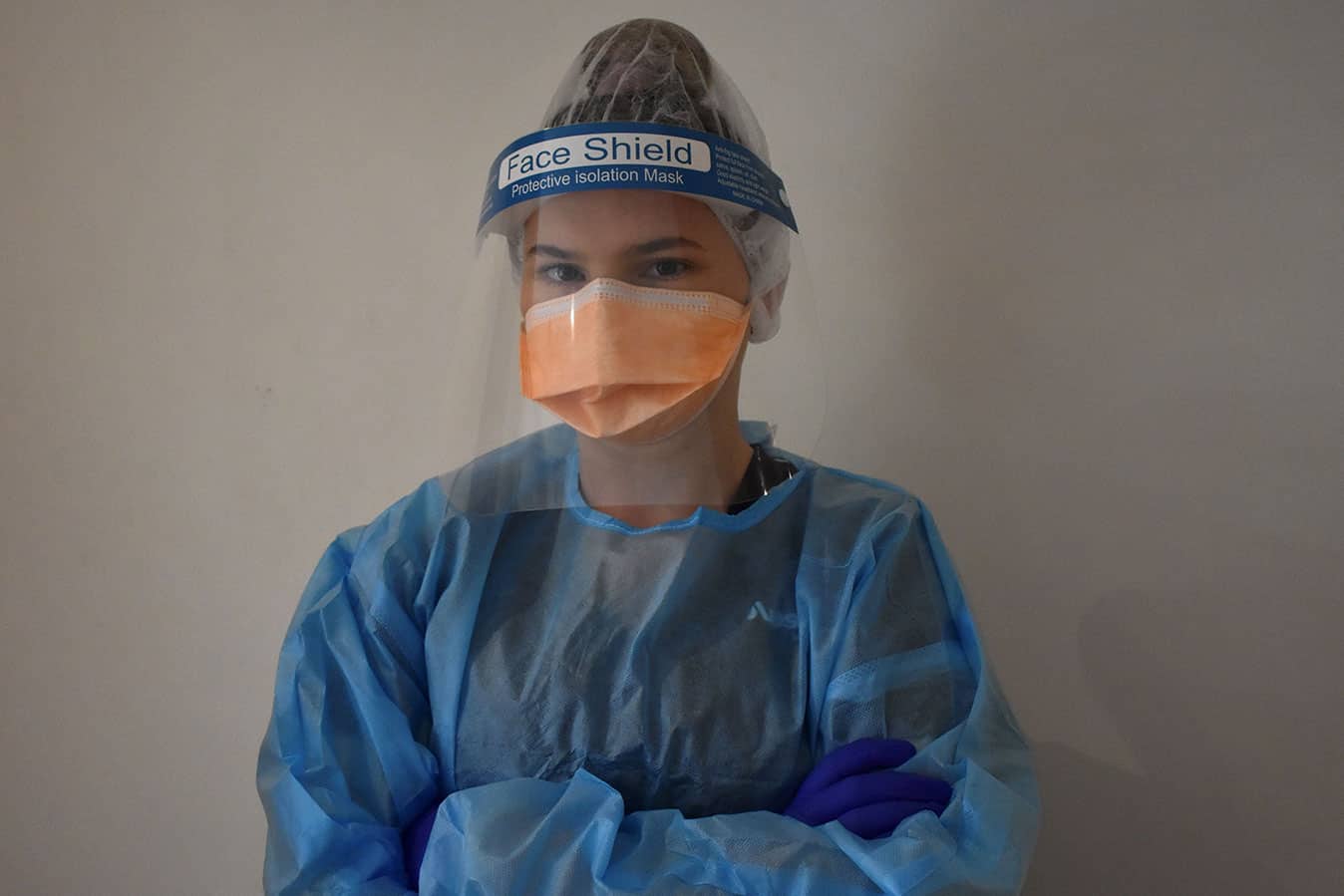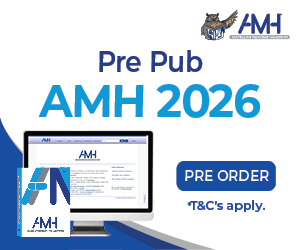In the early weeks of 2020, Charlotte Pope was filled with a mix of nerves and excitement as her graduate year of nursing with Austin Health fast approached.
“I was excited and eager to just start and get my feet on the ground,” she recalls.
“I was very nervous and anxious. It was just the fear of the unknown. Do I know enough? Am I ready? All those little thoughts that run through your mind.”
Just a couple of months into her first rotation on general medical, Charlotte joined the Austin Hospital’s dedicated COVID-19 wards as the pandemic began to sweep the country.
Understandably, she had imagined a trouble-free entry into the profession and admitted initially feeling overwhelmed as everything changed overnight. Many nurses stepped up to the COVID-19 frontline or shifted into other areas of need, while Personal Protective Equipment (PPE) became essential.
“I felt so much fear and anxiety,” Charlotte says.
“I almost felt ripped off in a sense, not in a selfish way, but because I was just settling into general medical and was suddenly pulled into this COVID world. I remember calling my brother in tears as I was just so scared of contracting COVID-19 and spreading it to my family. It was just the fear of the unknown and all that change hitting me at once.”
Charlotte quickly regrouped and set about playing her role on the frontline of the hospital’s pandemic response.

Outside the ward caring for suspected COVID-19 patients, the new normal involved donning and doffing stations for PPE gear before and after shifts to ensure nurses could protect themselves as well as patients.
The full gamut of PPE included a gown, gloves, N95 mask, goggles and hair net. Charlotte says wearing PPE for hours on end was tough and unrelenting.
“We were all very strict with our PPE because that was our protection,” Charlotte says.
“Wearing it all day, we’d get sores on our ears and nose from the mask. We all felt quite faint at times because you’re just breathing in through your mask at all times. It feels stuffy. It feels sweaty. It feels like you’re being suffocated a little bit.”
Even so, Charlotte suggests the biggest struggle was not being able to connect with patients like usual.
“You can’t smile at your patient and communicate in the same way as you normally do in nursing. We use a lot of facial expressions and communication. In a way, it felt like not having an identity.”
A typical day working on Austin Health’s ward dedicated for confirmed COVID-19 cases involved carrying out routine care, such as observations and assessments. But time was severely limited, to lessen staff’s potential exposure to the virus.
“My role was to medically be there for them [the patients],” Charlotte says.
“It felt like a very structured style of nursing because we couldn’t connect as much and be there to care. You went in the room to do your job and would pop out quickly.
“In the end, I felt we were their [the patients’] network. We were their family in a sense, and communication line. So we were still able to show our love and care. Sometimes, I had to be there for them if they were feeling isolated and sad and confused. It was a different style of nursing, because you had to protect yourself but also be there for them emotionally.”
The 22-year-old says many of the COVID-19 patients she provided care for at Austin had been transported from nursing homes that had experienced COVID-19 outbreaks.
“It was saddening because a vast majority of my patients were elderly and very confused,” she reveals.
“I think what got me the most was my patients that didn’t understand why they were isolated in a room and why we were dressed like this (PPE) and they couldn’t have their wife or family visit. Just that confusion and fear around it really got to me and the realisation that some of these patients might not even be coming out of the ward.”
A graduate nurse program typically provides a well-structured and supportive educational year where first year nurses can learn on the job and develop their clinical skills.
It’s challenging at the best of times, let alone during a global pandemic, and Charlotte concedes struggling to find a healthy work-life balance during her time on the COVID-19 ward at the peak of the pandemic.
“I tried to eat well and look after my health. I walked my dog every day and tried to get out and about, within the restrictions. I listened to my body when I needed a rest and just tried to not be so hard on myself emotionally. It was a big year for self-care because we’re all isolated and normally lean on each other so much for social networks and support.”
Charlotte says she felt supported by the hospital’s clinical educators throughout the pandemic and counts the solidarity and support shown by fellow nurses towards each other as equally reassuring.
“On one of my more down moments, where I was just burnt out and over the pandemic, one of my educators just said: ‘Take the time to look after you. We can’t look after others if we’re not looking after ourselves. Never be afraid to speak up and talk about your mental health and seek the support you need’.”
Altogether, Charlotte spent six months working on Austin’s COVID-19 ward. Her stint stretched from Victoria’s first wave to soaring cases in the second, and thankfully, cases recently being brought under control.
“I think we were a lot more mentally and physically prepared the second time around,” she says on reflection.
“We knew we could convert our ward into a COVID-19 ward overnight. We knew the drill, so that took away some anxiety compared to the first wave. However, it was still emotionally draining to experience a second wave. It felt like a bit of a stab in the back considering that as nurses we’re just going into work every day and trying to do the right thing, and then you have some people not abiding by the restrictions.”
Charlotte says one moment which has lasted with her from the pandemic involved sitting with an elderly patient isolated from his family while he sobbed.
“I was nursing him for many days and he just cried to me and I just held his hand,” she says.
“He was just emotionally over being in this isolated room and being sick. He was scared and just cried and cried. I just sat with him and all I could do was be there.”
While Charlotte was initially hesitant about shifting onto the COVID-19 ward, she believes the unique grad year experience has helped build her resilience and adaptability.

“As much as I didn’t want to be thrown into it [the pandemic] in the early stages, in hindsight, I’ve grown so much and I don’t regret being part of it as a nurse,” she says.
“I think it really increased my education and growth. This is something that will be with me my whole career now; that I got to work on a COVID-19 ward.
“This year has shown me just how much I’ve had to sink or swim. And I have swum. I’ve grown so much professionally just through learning to communicate better, connect with people on an emotional level and be family to patients rather than just doing my job and getting through my shift as a nurse.”
Charlotte was diagnosed with Non-Hodgkin’s lymphoma at age four and spent much of her childhood in and out of hospital. The care provided by nurses inspired her to pursue the profession in later years.
“I completely looked up to them and I always wanted to be a nurse from as far back as I can remember. My grandmother was also an incredible nurse and I’ve always looked up to her.”
Her transition to practice year has only cemented her decision. She says helping patients and their families during some of their most challenging and vulnerable times has been incredibly rewarding.
“I just love that I can impact people’s lives and be part of their health journeys because growing up, I was on the other side of the fence where people were helping me.”
Charlotte finished up on the COVID-19 ward in September and moved onto her second rotation on Austin Health’s Palliative Care Unit.
It offered a change of pace from the hustle and bustle of dealing with the pandemic.
“I think I was starting to get quite burnt out on the COVID-19 ward and a change of scenery has been really great.”
Moving forward, Charlotte says nobody knows what’s around the corner when it comes to COVID-19 and that following social distancing restrictions, wearing masks and practising good hand hygiene remains essential as the nation emerges from the worst of the pandemic.
Her advice to nursing and midwifery graduates beginning their careers during COVID-19 is to lean on each other for support.
“Never be afraid to speak up and ask questions and just create networks with each other because that’s what a grad year is for. You form friendships and find people you can trust and lean on,” Charlotte says.








